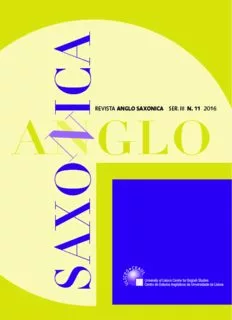
revista anglo saxonica ser. iii n. 11 2016 PDF
Preview revista anglo saxonica ser. iii n. 11 2016
A C I REVISTA ANGLO SAXONICA SER. III N. 11 2016 N AN GLO O X A S A C I REVISTA ANGLO SAXONICA SER. III N. 11 2016 N A NGLO O X A S ANGLO SAXONICA SER.III N.11 2016 DIRECÇÃO / GENERAL EDITORS Isabel Fernandes (ULICES) João Almeida Flor (ULICES) Mª Helena Paiva Correia (ULICES) Teresa Cid (ULICES) COORDENAÇÃO / EXECUTIVE EDITOR Teresa Malafaia (ULICES) EDITORES ADJUNTOS / ASSISTANT EDITORS Ana Cristina Mendes (ULICES) Carla Larouco Gomes (ULICES) REVISÃO DE TEXTO / COPY EDITORS Ana Cristina Mendes (ULICES) Carla Larouco Gomes (ULICES) EDIÇÃO Centro de Estudos Anglísticos da Universidade de Lisboa University of Lisbon Centre for English Studies DESIGN, PAGINAÇÃO E ARTE FINAL Inês Mateus IMPRESSÃO E ACABAMENTO SerSilito TIRAGEM 150 exemplares ISSN 0873-0628 DEPÓSITO LEGAL 86 102/95 Este trabalho é financiado por Fundos Nacionais através da FCT – Fundação para a Ciência e a Tecnologia no âmbito do projeto PEst-OE/ELT/UI0114/2013 To the Memory of Laura Fernanda Bulger / À Memória de Laura Fernanda Bulger (23rd May 1939–25th February 2015) Introductory note ISSN: 0873-0628 ANGLO SAXONICA SER. III N.11 2016 Introductory note This issue is dedicated to Laura Fernanda Bulger as a tribute to her life and work and in appreciation of her lifelong commitment to fostering mutual knowledge and understanding across the Atlantic, particularly between her native and her adopted country, respectively Portugal and Canada. Born in Lisbon on 23rdMay 1939, Laura Fernanda Bulger spent her childhood and youth in her native city, before moving to Toronto with her Canadian husband, John Bulger, and returning to Portugal thirty years later, living first in Porto and Vila Real and returning later to her birthplace where she spent her later years and died on 25thFebruary 2015. A citizen of the world, her attachment to Lisbon’s charms, its hills and streets, light and river, was laced with childhood memories of neutral wartime Lisbon and with youthful memories of the parochial atmosphere of the capital of the empire that Salazar held on to against all odds. These early memories, absorbed with a child’s keen attention to sounds, silences and gazes, to the said as much as to the unsaid, and her adult exposure to the “new world” of Canada and North America, found a way into her intellectual curiosity and academic interests. Having completed her secondary education in 1962, during the next three years Laura studied English and German Philology at the Faculty of Letters, University of Lisbon. Married in 1966, Laura and John Bulger settled in Toronto, Ontario, where she proceeded with her studies at the University of Toronto and obtained her B.A. in 1970 and her M.A. in 1976. In 1989 she earned her Ph.D. from the University of Porto, Portugal, with an influential thesis on the work of the Portuguese writer Agustina Bessa Luís, subsequently published as A Sibila: Uma superação inconclusa [The Sybil: An Inconclusive Overcoming], and awarded the Eça de Queiroz Literature Prize for essay. In the late 1980s, the Bulgers settled in 10 REVISTA ANGLO SAXONICA northern Portugal, and Laura took up a post as Assistant Professor at the University of Trás-os-Montes and Alto Douro, Vila Real. She embraced this new stage of her life with renewed energy and commitment and would earn her Habilitation in 2003. While in Canada she had assisted the Ontario Ministry of Citizenship and Culture in drafting the curriculum on Multiculturalism and had been involved in promoting Portuguese language and culture, both by collaborating in setting up Portuguese Studies at York University, and by liaising between Portuguese and Canadian entities to organize countless events showcasing Portuguese literature and cinema. Back in Portugal Laura Bulger not only continued to bring her insight into contemporary Portuguese literature, but also took it upon her to make Canadian literature and culture better known among us. In the process, she brought her experience of living between cultures to bear on her reflections on multiculturalism and postcolonialism, and her interest in literary theory stretched to include intermediality, as indicated by her Habilitation and later publications. Indeed, Laura Bulger’s transplantation from Salazar’s Portugal to Pierre Trudeau’s Canada must have proven as challenging as it was liberating, and it expanded her horizons in unexpected ways: not only was she exposed to the sheer vastness, as well as the linguistic, ethnic, and cultural diversity of Canada, but her involvement with the Portuguese community in Ontario, which at the time largely came from remote and impoverished areas in the Azores islands or inland Portugal, also faced her with bleak aspects of their shared native country that the urban Laura had so far been spared. Canada thus added vastness, nuance, and depth to her understanding of home and the challenges of belonging, and plunged her in the midst of debates on multiculturalism and how to negotiate the multiple legacies of colonialism and immigration. These concerns with in- betweenness would find their way into her academic writing as well as into her fiction, namely her short-story collection Vaivém (1986), translated into English as Paradise on Hold(1987). In her later years, Laura Fernanda Bulger moved back to Lisbon and participated with zest in its civic and intellectual life. After her retirement in 2010, her curiosity unabated, she continued to read, write, and attend conferences, and generously accepted our invitations to share her knowledge of Canadian literature and culture with graduate and
Description: